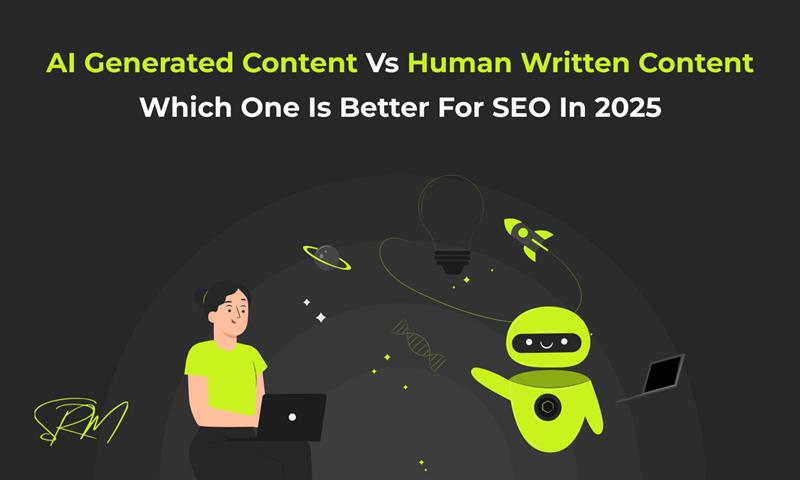
Introduction
In the ever-evolving world of digital marketing, the debate between AI-generated content and human-written content continues to gain momentum. With advancements in artificial intelligence, businesses are leveraging AI tools to produce content at scale. But does AI-generated content truly outperform human-written content when it comes to SEO in 2025? This blog delves into the differences, advantages, and challenges of both content creation methods and highlights the role of content optimization and quality content in ranking higher on search engines.
Understanding AI-Generated Content
AI-generated content is created using natural language processing (NLP) and machine learning algorithms. AI tools analyze large datasets, predict patterns, and generate text that mimics human writing. Some popular AI content generators include OpenAI’s ChatGPT, Jasper and Deepseek etc .
Advantages of AI-Generated Content
- Speed and Efficiency: AI can produce content within seconds, helping businesses scale their content marketing strategies.
- Cost-Effective: Reduces the need for large content teams, making it a budget-friendly option for startups and small businesses.
- Data-Driven Approach: AI analyzes SEO trends and integrates high-ranking keywords seamlessly.
Limitations of AI-Generated Content
- Lack of Creativity: AI-generated content often lacks originality, emotional depth, and storytelling elements.
- SEO Challenges: While AI can optimize content for keywords, search engines like Google prioritize quality content over keyword stuffing.
- Risk of Plagiarism: AI may unintentionally generate duplicate content, affecting SEO rankings negatively.
The Strength of Human-Written Content
Human-written content is crafted by professional writers who bring creativity, emotions, and expertise to the table. A professional content writer understands audience intent and tailors content accordingly.
Benefits of Human-Written Content
- Authenticity and Originality: Writers create unique content that engages readers and aligns with the brand voice.
- SEO-Friendly: Content created by humans naturally incorporates keywords while maintaining readability and engagement.
- Better User Experience: Well-structured articles, storytelling, and a conversational tone keep readers hooked, reducing bounce rates.
Challenges of Human-Written Content
- Time-Consuming: Writing high-quality content takes time and effort.
- Higher Costs: Hiring professional writers or SEO specialists may be expensive for small businesses.
AI vs. Human Content: Which One Wins for SEO in 2025?
1. Content Optimization
AI excels at optimizing content for search engines by analyzing trends and suggesting keyword placement. However, human writers ensure that content remains engaging and valuable, making it more effective for SEO in the long run.
2. Quality Content
Google’s algorithms prioritize quality content that provides real value to users. AI-generated content may lack depth, whereas human-written content offers in-depth analysis and personalized insights.
3. User Engagement
Search engines track user engagement metrics such as dwell time and bounce rates. Human-written content, enriched with creativity and storytelling, keeps readers engaged, leading to better SEO performance.
4. Google’s Perspective
Google’s Helpful Content Update emphasizes that content should be written for users rather than search engines. This aligns more with human-written content, making it a preferred choice for sustainable SEO success.
The Ideal Approach: A Hybrid Strategy
The best approach for SEO in 2025 is a hybrid model that combines AI efficiency with human creativity. Businesses can leverage AI for content optimization and research while relying on human writers to refine, personalize, and add depth to the content.
Conclusion
In 2025, AI-generated content and human-written content both play significant roles in SEO. While AI enhances efficiency and content optimization, human writers ensure quality content and engagement. The key to a successful SEO strategy lies in balancing both approaches. By integrating AI for automation and human expertise for creativity, businesses can achieve the best of both worlds and dominate search rankings.
For expert insights on content strategy and SEO, consult SEO expert Shiwali Ratan Mishra for personalized guidance.
FAQs
1. Is AI-generated content bad for SEO?
Not necessarily. AI-generated content can help with keyword optimization and research, but it needs human refinement to ensure quality and originality.
2. Can AI replace human content writers?
AI can assist writers but cannot fully replace them. Human expertise is crucial for creativity, storytelling, and brand authenticity.
3. Which is better for long-form content: AI or human writing?
Human writing is superior for long-form content, as it provides depth, analysis, and a natural flow that AI may struggle to replicate.
4. How can businesses balance AI and human-written content?
Businesses should use AI for data analysis and content structuring while relying on human writers for editing, personalization, and engagement.
Conclusion
In 2025, AI-generated content and human-written content both play significant roles in SEO. While AI enhances efficiency and content optimization, human writers ensure quality content and engagement. The key to a successful SEO strategy lies in balancing both approaches. By integrating AI for automation and human expertise for creativity, businesses can achieve the best of both worlds and dominate search rankings.
For expert insights on content strategy and SEO, consult SEO expert Shiwali Ratan Mishra for personalized guidance.





